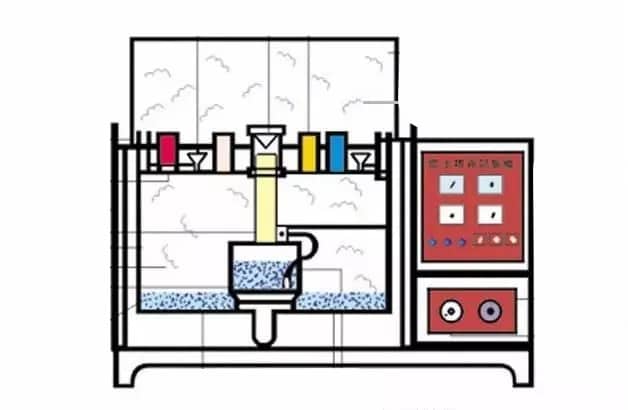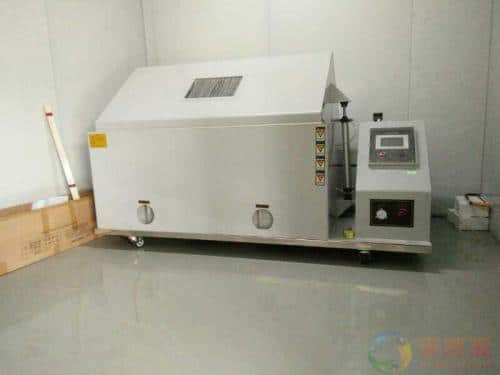Corrosion is the destruction or deterioration of materials or their properties under the action of environment. Most of the corrosion occurs in the atmosphere, which contains oxygen, humidity, temperature changes and pollutants.
Salt spray corrosion is one of the most common and destructive atmospheric corrosion. The corrosion of metal surface caused by salt spray is due to the electrochemical reaction between chloride ions penetrating the oxide layer and protective layer of metal surface and internal metal. At the same time, chloride ion contains a certain amount of hydration energy, which is easy to be squeezed out by the pores and cracks adsorbed on the metal surface and replace the oxygen in the oxide layer, turning the insoluble oxide into soluble chloride and the passive surface into active surface.
Salt spray test is a kind of environmental test which mainly uses the artificial simulated salt spray environmental conditions created by the salt spray test equipment to evaluate the corrosion resistance of products or metal materials. It can be divided into two categories, one is natural environment exposure test, the other is artificial accelerated simulated salt spray environment test.
Artificial simulated salt spray environment test is to use a kind of test equipment with a certain volume space – salt spray test chamber (as shown in the figure). In its volume space, artificial method is used to create salt spray environment to assess the quality of salt spray corrosion resistance of products.
Compared with the natural environment, the salt concentration of chloride in the salt spray environment can be several times or dozens of times of that in the general natural environment, so that the corrosion rate is greatly improved, and the time to get the results of the salt spray test is greatly shortened. If a product sample is tested in the natural exposure environment, it may take one year for its corrosion. However, if it is tested in the artificial simulated salt spray environment, it only takes 24 hours to get similar results.

The simulated salt spray in laboratory can be divided into four types
(1) neutral salt spray test (NSS test) is the earliest and most widely used accelerated corrosion test method. It uses 5% NaCl solution and the pH of the solution is in neutral range (6.5 to 7.2) as a spray solution. The test temperature is 35 ℃, and the sedimentation rate of salt spray is 1 ~ 2ml / 80cm / h.
(2) acetate spray test (ASS test) is developed on the basis of neutral salt spray test. It is to add some glacial acetic acid into 5% sodium chloride solution, so that the pH value of the solution is reduced to about 3, the solution becomes acidic, and finally the salt spray formed also becomes acidic from neutral salt spray. Its corrosion rate is about three times faster than that of NSS test.
(3) copper salt accelerated acetate spray test (CASS test) is a kind of rapid salt spray corrosion test developed recently abroad. The test temperature is 50 ℃, and a small amount of copper salt copper chloride is added into the salt solution to strongly induce corrosion. Its corrosion rate is about 8 times that of NSS test.
(4) the alternating salt spray test is a kind of comprehensive salt spray test, which is actually neutral salt spray test plus constant humidity and heat test. It is mainly used for cavity type products, through the penetration of wet environment, salt spray corrosion not only occurs on the surface of the product, but also inside the product. It alternates the product in salt spray and hot and humid environment, and finally checks whether the electrical and mechanical properties of the whole product have changed.
Result judgment
The results of salt spray test are generally given in qualitative form rather than quantitative form. There are four specific judgment methods.
① The grading method is to divide the percentage of corrosion area to total area into several grades according to a certain method, and take a certain grade as the basis for qualification judgment. It is suitable for the evaluation of plate samples.
② Weighing method is a method of weighing the weight of the sample before and after the corrosion test to calculate the weight of the corrosion loss to evaluate the corrosion resistance quality of the sample. It is especially suitable for the assessment of the corrosion resistance quality of a certain metal.
③ The corrosives appearance judgment method is a kind of qualitative judgment method. It judges the samples by whether the products are corroded after the salt spray corrosion test. This method is mostly used in general product standards.
④ The statistical analysis method of corrosion data provides a method to design corrosion test, analyze corrosion data and determine the confidence level of corrosion data. It is mainly used to analyze and count corrosion situation, rather than to determine the quality of a specific product.

Example: Salt spray test of stainless steel
Salt spray test, invented in the early 20th century, is the longest used “corrosion test”. It is favored by users of corrosion-resistant materials and has become a “universal” test. The main reasons are as follows: 1) saving time; 2) low cost; 3) testing a variety of materials; 4) the results are simple and clear, which is conducive to the settlement of commercial disputes.
In practical application, the salt spray test of stainless steel is the most well-known – how many hours can this material be tested in salt spray? Practitioners must be familiar with this issue.
Material suppliers usually use passivation treatment or improve the surface polishing level to improve the salt spray test time of stainless steel. But the most critical determinant is the composition of stainless steel itself, that is, the content of chromium, molybdenum and nickel.
The higher the content of Cr and Mo, the stronger the corrosion resistance to pitting corrosion and crevice corrosion. This corrosion resistance is expressed by the so-called pitting equivalent (pre): pre =% Cr + 3.3 ×% mo.
Although nickel can not increase the resistance of steel to pitting and crevice corrosion, it can effectively slow down the corrosion rate after the corrosion process begins. Therefore, austenitic stainless steel containing nickel often has better performance in salt spray test, and its corrosion phenomenon is much less than that of low nickel ferritic stainless steel with similar pitting corrosion equivalent.
Small knowledge: Standard 304, neutral salt spray is generally between 48-72 hours; standard 316, neutral salt spray is generally between 72-120 hours.
It should be pointed out that the salt spray test has significant defects in testing the performance of stainless steel. In the salt spray test, the chloride content of salt spray is very high, far beyond the real environment, so the stainless steel which can resist corrosion in the practical application environment with very low chloride content will also be corroded in the salt spray test.
Salt spray test changes the corrosion behavior of stainless steel. It can not be regarded as an accelerated test or a simulation test. The result is one-sided and has no equivalent relationship with the actual performance of the stainless steel finally put into use.
So we can use the salt spray test to compare the corrosion resistance of different types of stainless steel, but this test can only give the material rating. When selecting stainless steel materials, salt spray test alone usually can not provide sufficient information, because we lack sufficient understanding of the relationship between test conditions and practical application environment.
For the same reason, it is not possible to estimate the service life of products only based on the salt spray test of stainless steel samples.
In addition, different types of steel can not be compared, for example, we can not compare stainless steel and coated carbon steel, because the corrosion mechanism of the two materials used in the test is quite different, and the correlation between the test results and the final actual use environment is also different.









